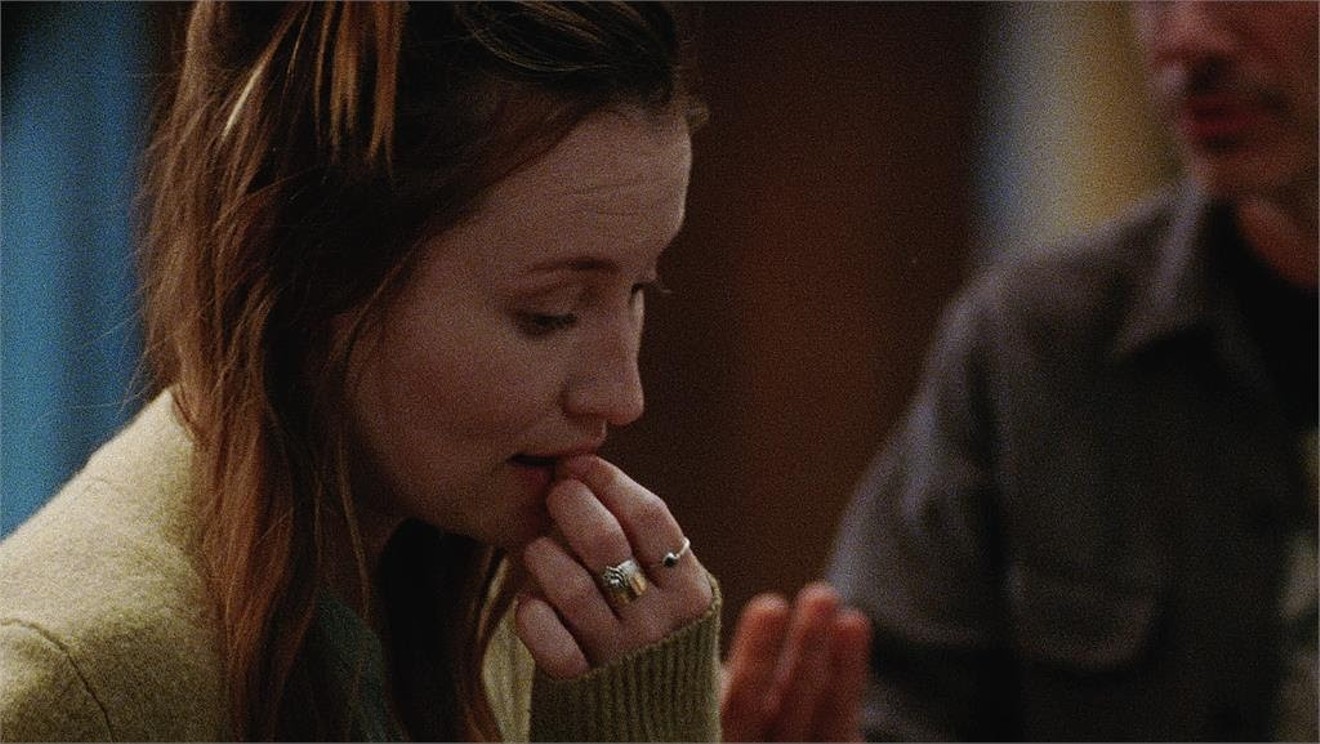With Golden Exits, Alex Ross Perry’s latest, the writer-director of such tightly focused studies as Listen Up Philip (2014) and Queen of Earth (2015) has made a through-and-through ensemble piece, one in which the emotional explosiveness comes not from a couple of principals but an expansive cluster of characters. The Brooklyn setting — all plant-suffused offices, invitingly uncrowded bars and homily embroidered living rooms — is as cloistered and contained as the bohemian New York of Philip or the tense upstate lake house of Earth.
But this time the characters, and their attendant connections, just keep piling up, each of them bursting with internal furies that they struggle to keep hidden. This galaxy of people overlaps in a minute geographical pocket, leading Golden Exits to burn with a feeling of immense smallness. The characters talk extensively about what matters to them rather than what matters to the plot, exposing themselves, sharing the worries that keep them up at night. One scene literally opens on someone casually asking a sibling, with reference to nothing in particular, “So, what’s the fear?” an almost unfathomable can-of-worms query that doesn’t lend itself to a dramatic encounter of predictable shape. That’s not a bad thing. The more microscopic and incidental the movie gets — as in this candlelit conversation — the grander its cumulative force becomes.
The springtime story, as small as a long-forgotten anecdote, traces just a few months and a couple of blocks. The catalyst is the outsider: Naomi (Emily Browning), a 25-year-old Australian in town on a work visa. She has been hired to act as an assistant for Nick (Adam Horovitz, of Beastie Boys renown), a middle-aged, salty-haired archivist who has been recently selected for a job, by his own family, to excavate and catalog the belongings of his deceased, magazine-running father-in-law. (Horovitz makes endlessly inventive use of a pair of reading glasses that come apart in the middle.) While preparing a get-to-know-you dinner for Naomi, Nick exchanges hissing remarks with his wife Alyssa (Chloe Sevigny) and her sister Gwendolyn (Mary-Louise Parker), suggesting that Nick has been unfaithful in the past. The insinuations of infidelity recur on Naomi’s first day of work in the archivist’s lovingly cluttered bunker, when Nick’s gaze lingers for too long on Naomi as she bundles her hair up in a tie.
But barely anything happens in Golden Exits, so Perry has clearly not set out to fashion a critique or upending of this familiar scenario: older man, younger woman, professional-personal overlap. (This is in contrast to, say, Paul Thomas Anderson’s Phantom Thread, which directly overthrows the expectations of agency in narratives in this vein.) Disinterested in cultivating suspense or even manufacturing incident, Perry instead generates spontaneity and intrigue through fresher means, constructing his scenes and characters with a wonderful idiosyncrasy: Naomi is introduced, in the second shot of the movie, singing “New York Groove” outside on a stoop, a charming display presented without a shred of situational context. (She breaks into song at one other juncture, again for reasons that remain unacknowledged.) Perry believes in the power of simply observing actors grapple with voluminous words. Often Golden Exits finds the director in an unhurried mood, content to let his stars share the frame as their characters unpack the eternal questions — as when Naomi, emboldened by a multiple-wine lunch break, asks Nick, “You really don’t get lonely?”
Nick and Naomi turn out to be just a sliver of the movie — after establishing that setup, Perry fans his situation out. He ropes into his scenario the bearded Buddy (Jason Schwartzman), who runs a recording studio with his wife Jess (Analeigh Tipton). Catching up over drinks, Buddy, a distant acquaintance of Naomi’s from over a decade before, reveals to the newcomer that, years earlier, he hired Jess to work for him, and then the two married. This further complicates Perry’s many-sided, regularly uncomfortable inspection of the perilous blending of love and work. In a companion sequence, this one of behavioral repugnance, Nick and his “fellas” (his word) get drunk on his birthday and gossip about Naomi. Golden Exits premiered over a year ago, at Sundance 2017, and the men’s proclamations here about the leniences they’re afforded in the workplace thanks to differentials of status and power between the sexes (“You can hire them, you can force them to be around you all the time,” shouts one of the men as beers are passed around) resonate even more monstrously today.
Meanwhile, on nights when Buddy is out of the house (and often peddling white-lie excuses in explaining why), Jess confers with her single sister Sam (Lily Rabe). For two years, Sam has been employed as a personal assistant for a relatively older, defiantly unattached, big-personality businesswoman, a situation that leaves her emotionally fatigued and plagued with insecurity and loneliness. In Jess’ company, Sam allows herself to voice these naked anxieties, sending herself into instinctive flights of stinging soul-searching. Rabe delivers Sam’s lines with such mature, flowing ease that the character’s most dexterous quips — “What a delight it must be to function as my sole outlet for a never-ending barrage of introspective blather regarding the choices that I have made,” she says to Jess — demand a beat before they register. They’re not literary punchlines but profound holders of pain and wisdom.
Perry packed Philip and Earth wire-to-wire with close-ups of such raw proximity that they seemed poised to send some viewers running for the emergency exits. Here, he employs gentler camera angles and positions. In between the passages of dialogue, Perry and his cinematographer, Sean Price Williams (working, as usual, on Super 16 mm), insert winsome shots of neighborhood portraiture: people in backpacks passing through to and from the park; cars approaching stop signs; the sun peeking through a tree. Early on, Nick tells Naomi that he considers his low-radius existence “thrilling” — he loves the fact that he can get anywhere he needs to on foot — and for significant stretches the movie shares in his delight, relishing the day-to-day charm of brownstone Brooklyn. In stitching the scenes together, Perry and his editor, Robert Greene, favor serenely paced fade-outs and cross-dissolves, both of which temper interactions ripe with potential hysterics. Even Nick showing up tipsy at Naomi’s apartment — the line-crossing that has been foreshadowed from the start — is rendered mercifully minor and even transient, swept aside through a soft transition.
Of course, this sense of a breezy mini-paradise doesn’t last; as with Perry’s other movies, the deceptions and confrontations are pervasive, and the director hasn’t given up entirely on those close-ups. (Some of the close-ups of Sevigny revert back to the Ingmar Bergman-level intensity of Earth, the camera seeming somehow capable of revealing inner scars.) The difference is that, in Golden Exits, the characters’ backstabbing of each other is often minor, unspoken and, in some cases, even downright considerate. Secrets and lies pile up as mundanely as dishes in the sink. The effect hits closer to home than in those earlier, prickly movies, because these characters are much more like your boring neighbors than the world-beating asshole at the heart of Listen Up Philip. They deceive, keep secrets, mean well and, most nights, after pondering the meaning of the day they’ve just had, go to sleep without making any changes in their lives.
Against the odds, it’s actually Tipton’s soft-spoken, understated Jess who emerges as the movie’s beating heart. In response to each looming crisis point — a suspicion about why Buddy is out so late, a cutting remark from her sister — Jess lightens the air with a beaming smile. She acknowledges the specter of imminent tragedy, and then moves on. Like Golden Exits, her decision to do so is both lovely and deeply sad.
[
{
"name": "Air - MediumRectangle - Inline Content - Mobile Display Size",
"component": "18478561",
"insertPoint": "2",
"requiredCountToDisplay": "2"
},{
"name": "Editor Picks",
"component": "16759093",
"insertPoint": "4",
"requiredCountToDisplay": "1"
},{
"name": "Inline Links",
"component": "17980324",
"insertPoint": "8th",
"startingPoint": 8,
"requiredCountToDisplay": "7",
"maxInsertions": 25
},{
"name": "Air - MediumRectangle - Combo - Inline Content",
"component": "16759092",
"insertPoint": "8th",
"startingPoint": 8,
"requiredCountToDisplay": "7",
"maxInsertions": 25
},{
"name": "Inline Links",
"component": "17980324",
"insertPoint": "8th",
"startingPoint": 12,
"requiredCountToDisplay": "11",
"maxInsertions": 24
},{
"name": "Air - Leaderboard Tower - Combo - Inline Content",
"component": "16759094",
"insertPoint": "8th",
"startingPoint": 12,
"requiredCountToDisplay": "11",
"maxInsertions": 24
}
]










